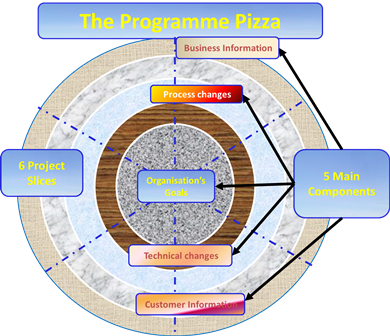Project, Portfolio or Programme - The Difference
Projects, Portfolios and Programmes – What is the difference?
 At what point is it fair to describe a project as a programme? Is it a question of size, complexity, or some other aspect that might cause a project to make the transition to become a programme? Much has been written in other blogs and references – some are below – and here is my summary.
At what point is it fair to describe a project as a programme? Is it a question of size, complexity, or some other aspect that might cause a project to make the transition to become a programme? Much has been written in other blogs and references – some are below – and here is my summary.
What is your view? Of the examples I provide which is a project in its own right; which is a project as part of a portfolio or of a programme; and which is a programme?

Example 1:
A new motorway or rail line fits this description. Each can be broken into major individual packages with clear deliverables, but the overall outcome is delivered by all of these projects coming together - a programme. HS2, Crossrail and the Channel Tunnel would all be programmes according to this definition. Each can be broken into projects with local benefits: new sections of usable rail, and new stations providing some facility for improved transport. The overall benefit arises from the whole new link. But these are still thought of as projects rather than programmes.
An oil refinery or power station is similarly complex although they have similar procurement arrangements: these are both customarily broken into major work packages which are projects in their own right for the organisations delivering them as well as for the client measuring and paying for delivery. However there is no real value in completed civil engineering works, mechanical works, chemical processing works, and logistics facilities for product output until the refining facility or power generation is available as a complete entity. The real value is only available when the refinery or power station is delivered. But is it still a project or could it be described as a portfolio of projects or as a programme?
Both can be described as major projects and are at least as complex to deliver as HS2 but still do not achieve ‘programme’ status for the person who manages them. This seems wrong in essence although I doubt whether the people who manage these projects would be concerned about their titles. But clearly a person who manages an oil refinery project is capable of managing a programme.
Example 2:
A property data project. This project for which I was manager provided its main benefit through the participation of local authorities and central government agencies for each of which there was their own project: cleaning data and removing duplicates; adopting a single local database; changing processes to make sure that data was maintained to cater for changes; incorporating software for data exchange and data sharing. In parallel there were other projects to create a central database which similarly had to be cleaned and checked, with new processes to ensure that it could be maintained. Each of these projects brought benefits for individual organisations but the overall benefit was achieved when they were all grouped together. This project was surely a programme under any definition: it took at least four years; it involved over 300 organisations; it required the same resources across multiple organisations; it brought local as well as national benefits.
Example 3:
A national developer creates a number of new housing or industrial estates, driven by local demand, real needs, and politics, and constrained by funding, land availability, transport, economics, and politics again. Each of these new estates provides benefits but in economic terms the overall benefit will also be judged regionally or nationally: homes, industry, transport and human happiness blend to provide a magnet for growth. Is this a programme? Or is it a portfolio of projects?
You might ask why this matters. Increasingly people are defining their roles and requirements in terms such as programme director and programme manager, with an expectation that the people who take on these roles will have obtained experience and qualifications in programme management. But are the people in the selection process fully aware of the work and skills required for complex projects which might be termed programmes? And what are the real skills and experience that will make a difference?
Please provide your thoughts: examples of projects and programmes and what the differences are.
Useful links
http://pmtips.net/difference-projects-programmes/
http://en.wikipedia.org/wiki/Program_management
http://www.independent-consulting-bootcamp.com/difference-between-a-project-and-a-program.html
